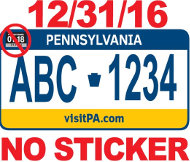5/6/2016
Pennsylvania Plans On Dumping Auto Registration StickersDispute over license plate registration stickers exposes legislative intent.

Beginning on January 1, Pennsylvania motorists will no longer need to place registration stickers on their license plates. The move was intended to give a significant boost to the automated license plate reader (ALPR or ANPR) industry, but it has also kicked off a debate in the General Assembly over whether these stickers are simply a means of generating $29 million in annual citation revenue.
The decision to go tagless was made in a single sentence slipped into Act 89, the massive state transportation funding measure signed into law in 2013.
"Validating registration stickers shall not be issued or required to be displayed," the law states.
Few noticed the provision, but once the Pennsylvania Department of Transportation (PennDOT) began making plans to implement the new rule, lawmakers in the state House decided this change might not be in the public interest. By a 155 to 36 margin, state representatives voted to reinstate the sticker requirement because law enforcement agencies realized that it would be too expensive to deploy enough automated cameras before the law takes effect.
"The only alternative to these stickers would be a camera in every police unit, patrol unit, in the Commonwealth of Pennsylvania," state Representative Dom Costa (D-Allegheny County) said. "Those cameras which scan licenses for stolen and expired are $18,000 apiece. Now, I do not know any of us that can put out that kind of money to support our local law enforcement."
Officials are concerned about the financial impact of requiring the purchase of expensive camera systems to resume high-volume issuance of the $113 tickets for expired stickers. Local and state police wrote 259,778 of these tickets in 2010, generating $29,484,803 in revenue.
The state Senate without a vote dropped Costa's bill from active consideration last month. Opponents expressed concern about the way stickers are used as an excuse to search vehicles and issue tickets.
"I do not think we are supposed to create laws to create opportunities for people to break the law so that we can make money off of it," state Representative Dan Truitt (R-West Chester) said. "That is just not the way it is supposed to work... I do not think that when the framers of the Constitution created the amendment that said that we had a right not to have unreasonable searches and seizures that it was their intention that we would go out and create ways to fabricate probable cause so that we could be pulled over and have our cars searched and so forth."
ALPR systems can scan up to 3000 license plates per hour, logging the travel patterns of individual motorists in a central database.


